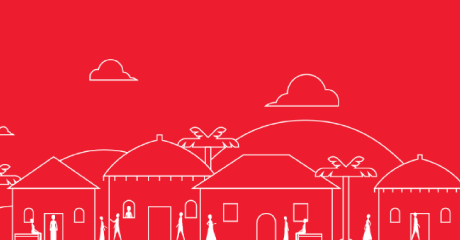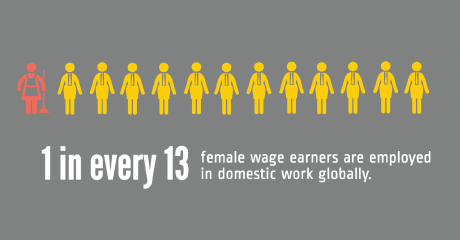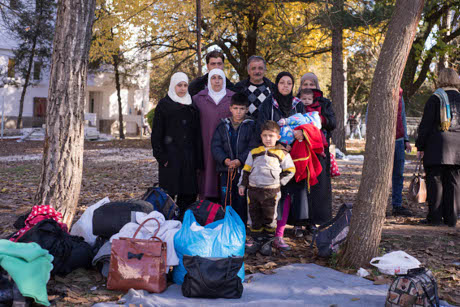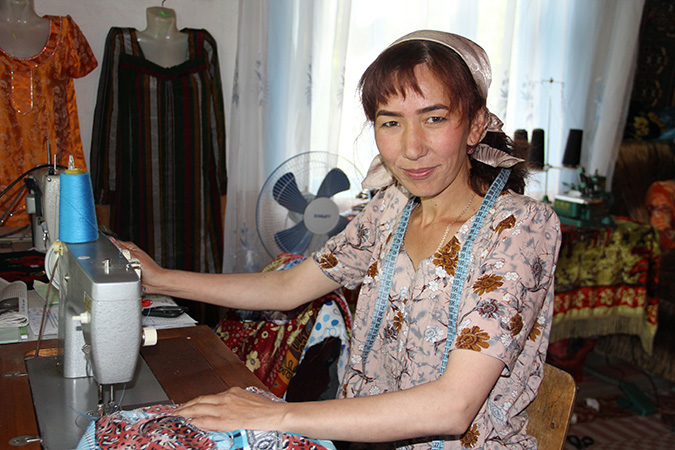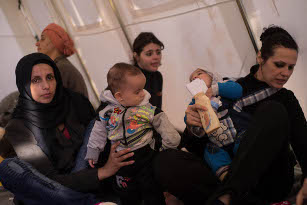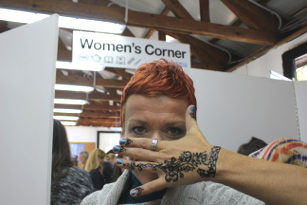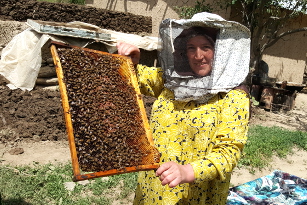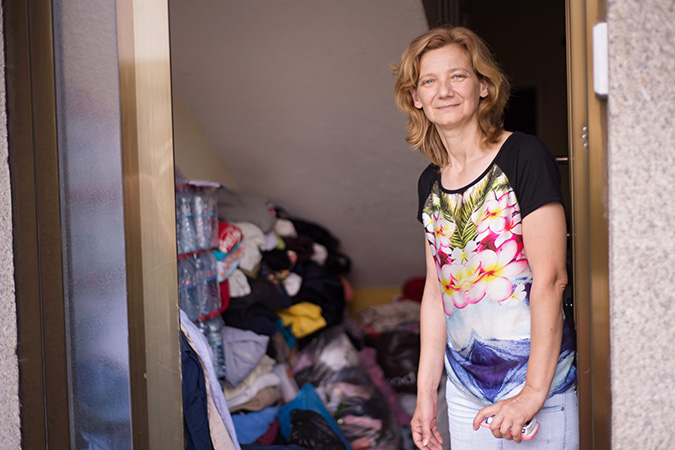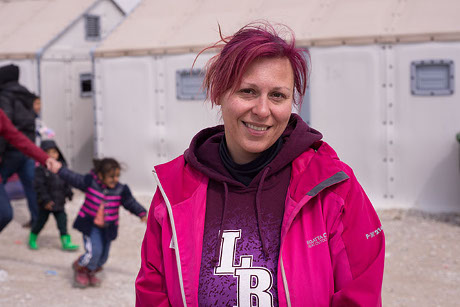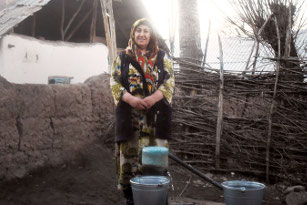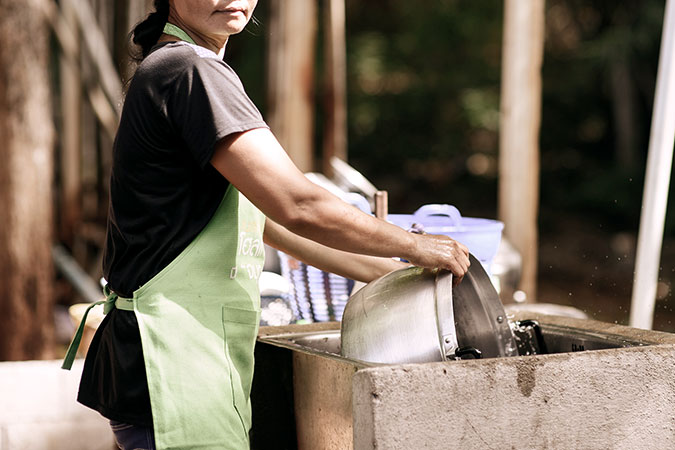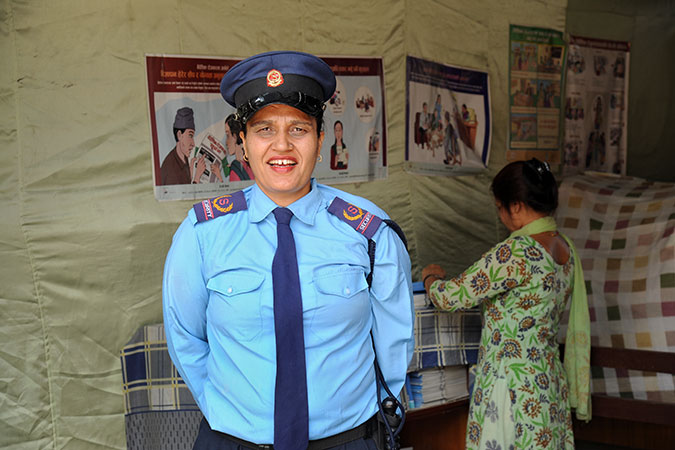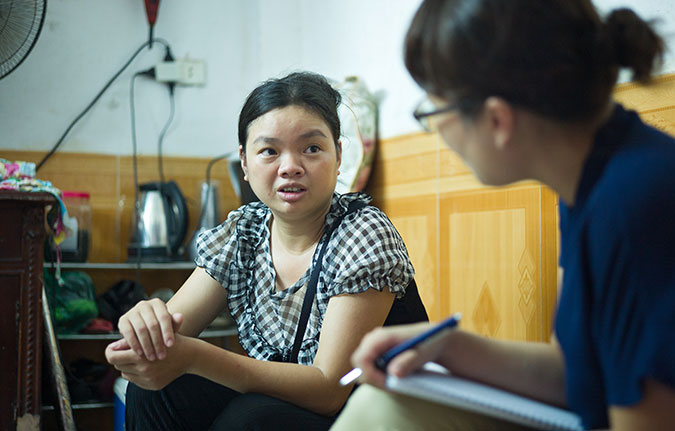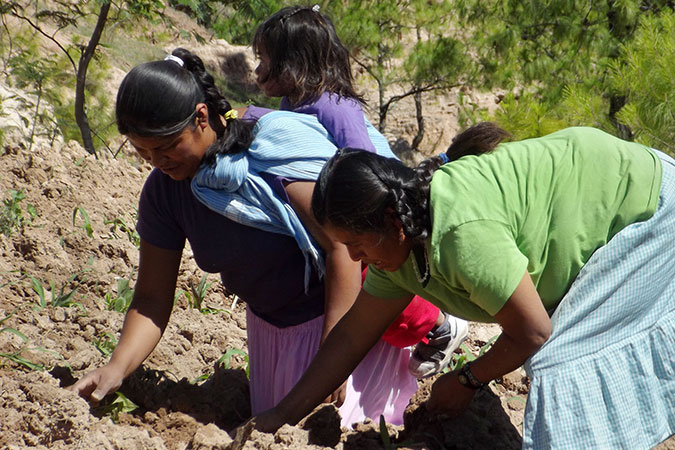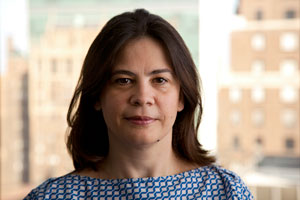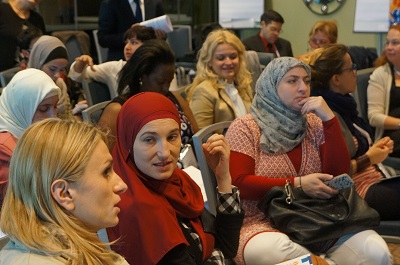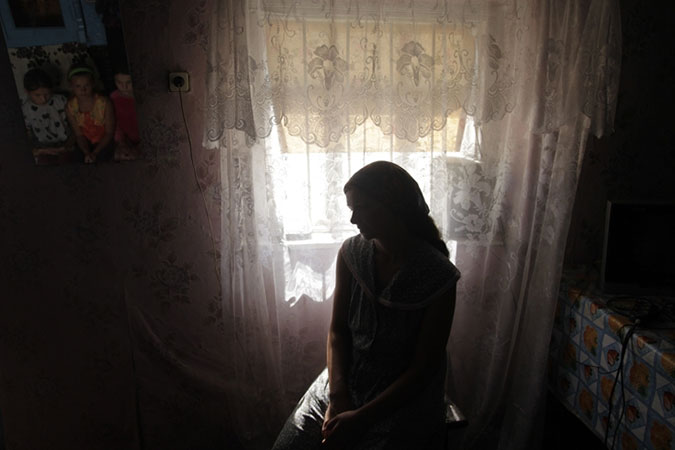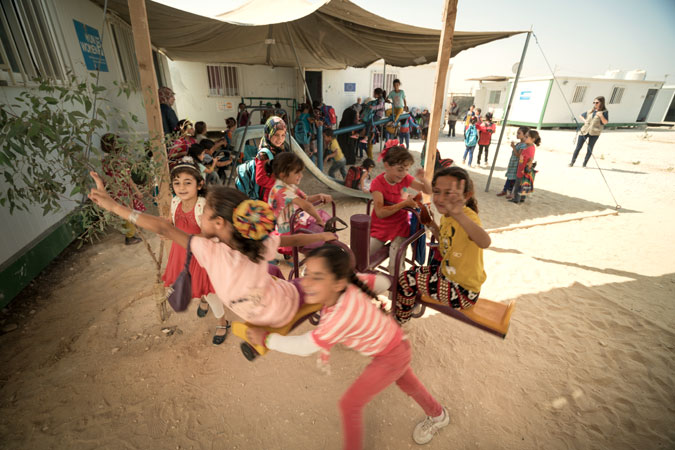Women refugees and migrants
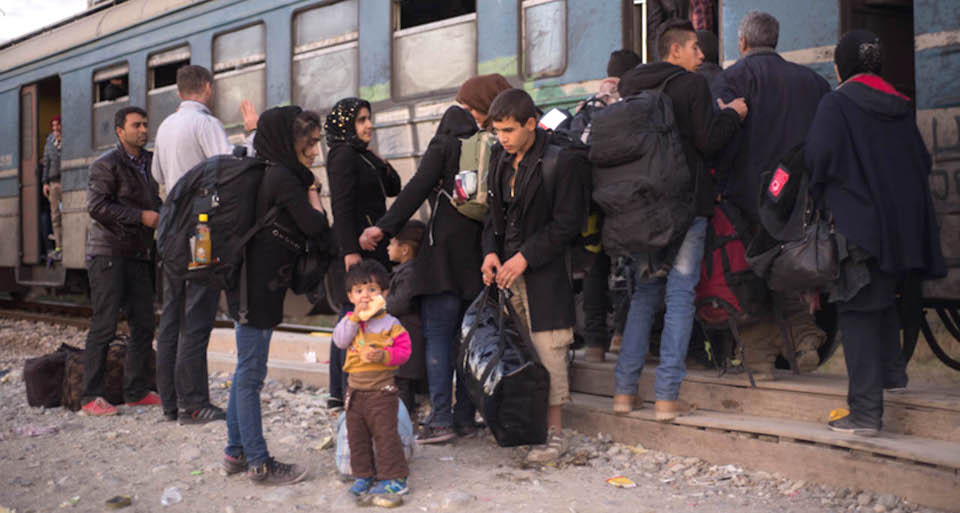
Infographics | Snapshots | From where I stand... | Speeches and statements |
Join the conversation |More stories | Publications|
The issue
Today, around the world, people are on the move. They are migrating to escape poverty, improve their livelihood and opportunities, or escaping conflict and devastation in their own countries. Women represent almost half of the 244 million migrants and half of the 19.6 million refugees worldwide [1].
In 2015 over one million women and men sought asylum in Western Europe. The transited from Turkey to Greece and traveled through the Western Balkans to reach destination countries further north. For the countries of the Western Balkans, especially for the former Yugoslav Republic of Macedonia and Serbia this was the first time they were confronted with such a massive refugee flow since the Yugoslav wars. Up to 42 per cent of refugees and migrants in the Balkans are women and children [2]. The March 2016 closure of borders along the Balkan route tens of thousands of people stranded.
Refugee and migrant women and girls face specific challenges and protection risks in transit, including family separation, psychosocial stress and trauma, health complications, particularly for pregnant women, physical harm and injury , and risks of exploitation and gender-based violence. Women also often serve as the main caretakers for children and elderly family members, further deepening their need for protection and support.
Fast facts
- In 2015 over one million women and men sought asylum in Western Europe.
- Up to 42 per cent of refugees and migrants in the Balkans are women (17%) and children (25%).
- By October 2015, women comprised 18%, 12% and 15% of Syrian, Afghan and Iraqi asylum seekers respectively.
- Everyday, about 100 refugees per day are being pushed back from FYR Macedonia to Greece. In different reports from field workers it can be seen that approximately 100 people a day are crossing into the country illegally with the help of smugglers.
- In Serbia, access to information on legal rights and services to women and girls' refugees and on the specific risks of trafficking and smuggling provided to 4,000 women and girls.
- Between 2000 and 2015, the number of international migrants has increased by 41 per cent to reach 244 million. Almost half of them are women [3].
- Migrants, especially migrant women, have higher labour force participation rates (72.7 per cent) than non-migrants (63.9 per cent) [4].
- Almost every sixth domestic worker in the world is an international migrant, and women make up 73.4 per cent of international migrant domestic workers [5].
- Today, 50 per cent of the world's refugees are women and girls [6]. Yet, only 4 per cent of projects in UN inter-agency appeals were targeted at women and girls in 2014, and just 0.4 per cent of all funding to fragile states went to women’s groups or women’s ministries from 2012 to 2013 [7].
- According to UN reports, 60 per cent of preventable maternal deaths take place in humanitarian settings and at least 1 in 5 refugees or displaced women are estimated to have experienced sexual violence [8].
Placing women in decision-making roles and including their needs and realities in policies and solutions designed to address global migration and the refugee crisis make them more sustainable and responsive.
Looking for more facts and figures? See our related infographics.
The United Nations Summit for Refugees and Migrants
Addressing the unprecedented large movements of refugees and migrants needs a more humane and coordinated approach that all countries can endorse and implement. On 19 September, on the occasion of the 71st session of the UN General Assembly, Heads of State and Governments will come together at the first-ever high-level summit for refugees and migrants to discuss the key elements of a global compact for safe, regular and orderly migration and a global compact on responsibility-sharing for refugees.
The day-long summit is expected to generate global commitments to address the root causes of large movements of refugees and migrants; to ensure at all stages, the human rights, safety and dignity of refugees and migrants; to provide protection from violence; and to prevent discrimination and xenophobia. World leaders are also expected to discuss a more predictable and equitable way of responding to large movements of refugees through responsibility-sharing and a comprehensive response plan for refugees.
With refugee and migrant women playing a pivotal role around the world to sustain communities and economies, the global commitments must include achieving gender equality, the empowerment of all women and girls and their human rights as underlying principles, address the unique needs of women and girls, include their voices, and be accountable to them.
Snapshots of our work
UN Women assesses the needs of women migrants and refugees in Serbia and fYR Macedonia
Despite gender-sensitive good practices, a UN Women assessment found that response-planning, services, protection capacity and information are not yet sufficient to meet the needs of migrant women and girls in Serbia and fYR Macedonia.
Left behind Tajik women overcome hurdles through trainings and self-help groups
As Tajik men migrate for work overseas in pursuit of a new life, some abandon their wives and children. A UN Women programme supports livelihood trainings and self-help groups for abandoned wives of migrant workers. The project has also led to the recognition of abandoned wives and children as a socially vulnerable group in the law, facilitating their access to free legal, economic and psycho-social services.
UN Women calls for effective protection fo refugee women and girls in the context of European Council Summit
In the context of European Council meeting held on 17-18 March 2016, UN Women calls for the specific needs and vulnerabilities of women and girls to be addressed in the response to the refugee and migration crisis.
Women refugees and migrants get a place of their own
Complete with Middle Eastern music, smells of home-cooked recipes and plenty of smiling faces, Women's Corner officially opened its doors in Belgrade. It's a place where women refugees and migrants mingle with Serbian women to exchange experiences, feels like a best friend's living room.
Women's self-help groups in Tajikistan foster independence and pride
In Tajikistan's Rasht Valley, budding entrepreneurs and women who dream to better their circumstances get training and support from a UN Women project that changes lives and builds futures.
From where I Stand
This editorial series captures the unique and powerful stories of people around the world, through compelling first-person accounts of their daily sustainable development challenges and how they are bringing about change. Read more»
“It took me only two days to realize who they were and why they were passing by my house by the railway track...”
Lenche Zdravkin, a legend in the former Yugoslav Republic of Macedonia for her work with the refugees, speaks about how meeting refugees crossing the border has shifted her perspective on life. Read more»
“The main challenge for women migrant workers is that they don’t know what rights they have....”
Sonja Dimitrijoska, a humanitarian aid worker, helps support women and girl refugees in transit centres in Western Balkan. Read more»
“After my husband was killed in Russia, I had to take care of everything on my own. How many gallons of water can a woman carry each day? "
Surayo Mirzoyeva took part in a self-help group supported by the UN Women speaks about how they provided clean drinking water to their village. Read more»
Speeches and statements
- UN Women statement on World Refugee Day (20 June)
In a statement for World Refugee Day on 20 June, UN Women calls for urgent action to ensure refugee women and girls have access to secure transit routes, safe spaces and protection when they arrive in a host country, and resources and services that will help them to build a post-conflict life free from violence and poverty. - Deputy Executive Director calls for cooperation to ensure safety and dignity of migrants and refugees (18 May)
Remarks by UN Women Deputy Executive Director Lakshmi Puri at the “Large Movements of Refugees and Migrants: Critical Challenges for Sustainable Urbanization” event on 18 May in New York.
Join the conversation
Help us bust the myths about women and girls on the move! With your tweets and posts you can move the conversation forward and raise awareness about the rights and needs of women refugees and migrants using the hashtag #UN4RefugeesMigrants. A social media package with sample messages in English, Spanish and French is available here.
#UN4RefugeesMigrants TweetsFollow us:
@unwomeneca, on Twitter
UN Women Europe and Central Asia, on Facebook
More stories from around the world
Creating “happy homes” for domestic workers in Asia Pacific
Live-in domestic workers in the Asia Pacific region often experience multiple abuses. The innovative Happy Home Campaign has launched a video series to raise awareness of the rights and obligations of domestic workers and their employers. The campaign encourages employers to take the lead in creating happy home environments.
From where I stand: Khet Kumari Ghimere
When she was 21, Khet Kumari Ghimere migrated to Kuwait as a domestic worker. Overworked, abused and underpaid, she returned to Nepal after two years. Today she works as a security guard at the emergency shelter for migrant women run by the organization, Pourakhi, which is supported by UN Women.
Migrant women of Viet Nam claim social protection and rights
An estimated 40 – 50 per cent of migrants in Hanoi and Ho Chi Minh City, the two biggest cities in Viet Nam, are women, and they face distinct challenges. More than 10,000 migrant workers have learnt how to access social welfare benefits, legal protection, health care and more through a programme supported by UN Women’s Fund for Gender Equality.
Women migrant workers in Mexico organize for their rights
Training workshops organized by UN Women and partners brought together local organizations, migrant women and civil servants in Mexico to discuss ways to address migration, gender and development.
Expert's take: Bringing light to the darkest places
Blerta Aliko, who leads UN Women’s Humanitarian unit, reflects on the current unending flurry of humanitarian disasters around the world.
Civil society advocates forge recommendations ahead of World Humanitarian Summit in Istanbul
Ahead of the World Humanitarian Summit, UN Women and Oxfam brought together more than 50 refugee advocates from 15 countries in Europe, the Middle East and North Africa to formulate a joint position on how to respond to the challenges faced by refugee women and girls. Governments should ensure refugee women’s participation in decisions that affect them, said participants at the “Women on the Move” workshop.
Breaking the cycle of human trafficking in Albania
To support women and girl survivors of trafficking, UN Women in Albania has been supporting service-providers in shelters with capacity-building and salary subsidies. A national public awareness campaign against the trafficking of women and girls has been launched, and journalists have been trained to report more accurately and effectively on human trafficking.
A snapshot of UN Women’s work in response to the crisis in Syria
During the ongoing conflict in Syria, UN Women has been actively working to highlight the distinct needs of women and girls, including protection and resilience, and promote their role as meaningful participants in conflict-resolution, peacebuilding and eventual recovery and development.
Publications
Women Migrant Workers' Human Rights
UN Women’s series Transforming Our World presents succinct thematic documents with the aim of raising awareness on the importance of tackling inequality and on the legal framework that protects the rights of women as well as promote solutions to these issues from all areas of society.
Gender Assessment of the Refugee and Migration Crisis in Serbia and fYR Macedonia
This publication is a gender analysis of the response in fYR Macedonia and Serbia which looks at the main risks that women and girl refugees face; classifies the services available for women; determines which barriers exist to access services and information for women and recommends how gender issues can be mainstreamed in the national and international response.
The Effect of Gender Equality Programming on Humanitarian Outcomes
Based on evidence gathered directly from crisis-affected populations, “The Effect of Gender Equality Programming on Humanitarian Outcomes” study presents a compelling case that gender equality programming makes a positive contribution to improving humanitarian outcomes. The study also provides practical recommendations on the best means to integrate gender equality programming into future humanitarian interventions in ways that strengthen effectiveness and inclusiveness.
The Status of Domestic Workers in Kazakhstan
This report on the status of domestic workers in Kazakhstan examines the policies and procedures of Kazakh domestic worker employment agencies and the gender mainstreaming and migration issues domestic workers face. Conducted as part of the second phase of the Regional Migration Programme implemented by the IOM, UN Women and the World Bank, the study recommends ways to improve the legislation and law enforcement practices governing Kazakhstan’s private employment agencies.
Domestic Workers in Russia and Kazakhstan
One of the first of its kind in Central Asia, this study by Moscow's Migration Research Centre assesses the needs and priorities of Central Asian and internal migrant domestic workers in Moscow and St. Petersburg, Russia and Astana and Almaty, Kazakhstan. Its findings provide the basis for further work to improve the policies regulating domestic workers.
Notes
[1] UN General Assembly (2016). In safety and dignity: addressing large movements of refugees and migrants, Report of the Secretary-General.
[2] UN Women (2016) Gender Assessment of the Refugee and Migration Crisis in Serbia and fYR Macedonia
[3] UN General Assembly (2016). In safety and dignity: addressing large movements of refugees and migrants, Report of the Secretary-General.
[4] ILO (2015). ILO global estimates on migrant workers
[5] Ibid. p.7
[6] UNHCR http://www.unhcr.org/en-us/women.html
[7] UN OCHA (2015) World Humanitarian Data and Trends, p. 23.
[8] United Nations Economic and Social Council (2014) Gender equality and the empowerment of women in natural disasters, Report of the Secretary-General.
